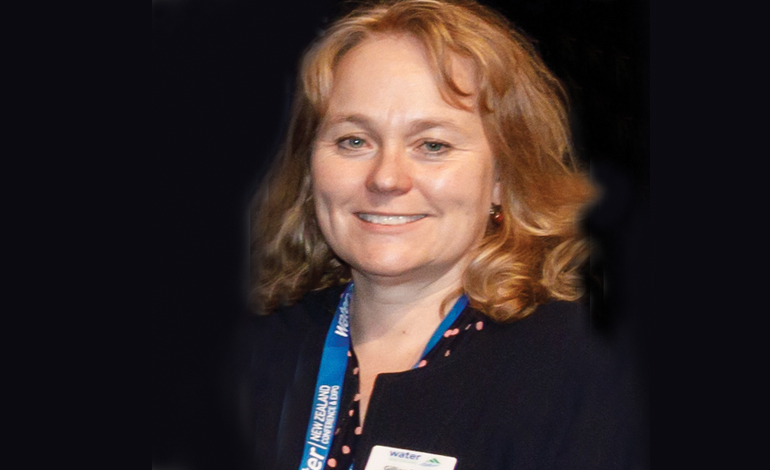As the water reforms unfold, it’s clear that one of the biggest challenges facing water utilities will be the need to ensure a competent, professional, highly skilled workforce. Water New Zealand CEO Gillian Blythe outlines the steps being taken to help local authorities meet the new requirements.
At the Water New Zealand conference held in Hamilton in November 2020, the Taumata Arowai establishment CEO, Bill Bayfield told water sector delegates that, while the new regulator is prepared to work collaboratively with water service providers, he will also hold them to account if they fail in their duties to provide safe drinking water.
This sends a stark warning to water sector leaders that unacceptable lapses in good practice will no longer be tolerated.
The backdrop to Bill’s very clear signal is the obvious need to ensure that right across the country, drinking water is safe to drink and that we can’t allow another contamination crisis such as Havelock North to occur.
The new regulator won’t just have its sights set on drinking water. It will have “oversight” of waste and stormwater. As the Minister of Local Government, Nanaia Mahuta, has put it – the regulator will also “shine a light” on one or both of the other two areas of water service. Just how that will unfold isn’t yet clear. The past few months have involved plenty of discussions across the sector about what the final outcomes of the reform process will be.
Indeed, the past few months have been ones of intense effort with council staff grappling with various Requests for Information on the state of water assets as well as meeting opportunities from the Government’s $761-million kick-start for improving water infrastructure.
Add to this the pressure of a big shortage of skilled water sector staff across the country.
The Water Services Bill hasn’t finished working its way through Parliament and we don’t know what water service delivery model will eventually emerge .
But we do know that any changes won’t happen overnight and in the meantime we need to ensure our workforce is fit-for-purpose so that we can meet the required water safety standards.
That’s why Water New Zealand has been working on a number of initiatives aimed at helping water suppliers upskill staff and lift their game.
Competency framework
The framework describes what people should be able to do and what they need to know to competently undertake their work. This will help identify the knowledge and skills required, assess levels of staff training required and then develop the best training programmes.
The competency framework is a work in progress and should be viewed as the first step in a journey the water sector in New Zealand is taking to upskill a fit-for-purpose workforce. The framework is being developed on a role-by-role basis, and currently there are four roles already developed.
Drinking water
Drinking Water Treatment Operators: These are the people who operate the systems and equipment used to treat raw water so that it can be supplied to the community. They operate water treatment processes like chemical dosing, filtration and disinfection. They collect and analyse data on the processes and carry out first-line maintenance tasks.
Drinking Water Distribution Operators: These are the people who look after the pipes, mains and pumping stations that supply the community with water. They carry out planned, preventative maintenance as well as respond to incidents such as burst pipes and major leaks.
Wastewater
Wastewater Treatment Operators: These are the people who operate the systems and equipment used to ensure that sewage is treated before being returned to the environment. They operate wastewater treatment processes such as preliminary and biological treatment, they collect and analyse data on the processes and carry out first-line maintenance tasks.
Wastewater Network Operators: These are the people who look after the sewers and pumping stations which carry wastewater from people’s homes to wastewater treatment plants. They carry out planned and preventative maintenance and diagnose and respond to faults and blockages.
An overview document has also been developed that is updated each time a new role is developed. Currently the list of roles for development range from small water suppliers to instrument technicians and trade waste officers. The overview document is available on our website – www.waternz.org.nz.
WIPA CPD and registration programme
We are also encouraging water and wastewater professionals to apply for enrolment in the WIPA (Water Industry Professionals’ Association) CPD and registration programme.
This is another initiative aimed at providing a continuing professional development and registration programme. This is ideal for water industry professionals to demonstrate that they have achieved water industry professional registration.
Through this programme, they will gain access to WIPA approved training courses with allocated CPD credits.
New Zealand Certificate in Wastewater Treatment
Last year, the infrastructure ITO, Connexis, released two new Level 5 water-related diplomas: Drinking-water Treatment, and Wastewater Treatment.
These diplomas were developed with industry and targeted at qualified operators working in supervisory positions in New Zealand’s Water and Wastewater Treatment plants.
At the same time, we were very pleased to see that, despite the challenges around the pandemic, 44 water sector workers completed their New Zealand Certificate Level 4 in drinking and wastewater treatment.
This qualification will set these graduates up to continue their industry training beyond their Level 4, and we certainly urge all employers to encourage staff that haven’t already done so, to complete these diplomas.
There’s a growing list of opportunities and initiatives for what is becoming an industry that offers plenty of scope for continuous professional development and upskilling the workforce. If you would like more information please contact Water New Zealand’s Training Development Manager, Mumtaz Parker: training@waternz.org.nz.



